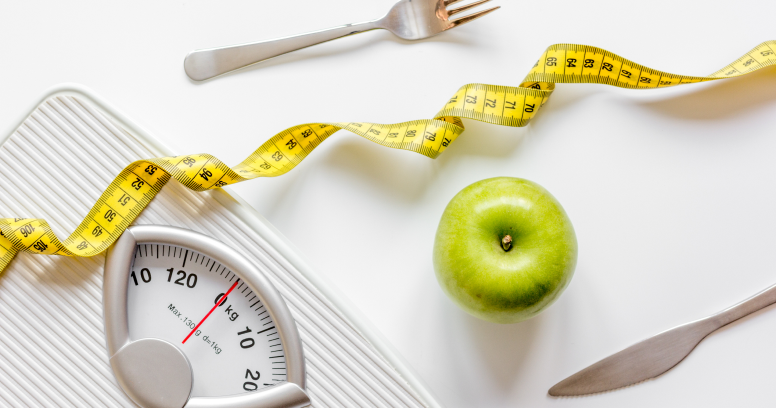How much weight can you lose with intermittent fasting?

How much weight can you lose with intermittent fasting?
Traditional nutrition advice would say — it depends. And it does. But on what?

And even with those “it depends” factors, is it possible to give even a ballpark answer to this question?
Why yes, it is! Let’s check it out.
So, how much weight can you lose with only intermittent fasting?
How much weight can you lose by intermittent fasting if you do it with no extra bells and whistles? Here’s what science says.
A systematic review of 27 studies looked at how various intermittent fasting schedules affected the weight of those living with overweight and obesity over the short (2–26 weeks) and long term (1 year). It found that all 27 trials led to a weight loss of 0.8% to 13.0% of participants’ starting weight.[1]
Let’s make those percentages more graspable. For someone who weighs:
- 150 lb., that’s between 1.2 lb. (0.8%) and 19.5 lb. (13%) lost
- 200 lb., that’s between 1.6 lb. (0.8%) and 26 lb. (13%) lost
- 300 lb., that’s between 2.4 lb. (0.8% and 39 lb. (13%) lost
It’s a fairly varied range, but it shows intermittent fasting has the potential for significant weight loss.
Can we categorically say that those who took part in these trials were only doing intermittent fasting? Maybe not. It’s possible that those who lost more weight were doing other things too.
What other things, you wonder? Great question! We’ll come back to that a bit later.
How soon can you see weight loss results?

As we’ve seen, research shows it can take anywhere from 2 to 26 weeks (or even up to a year) to see significant weight loss on intermittent fasting.
In our examples above, if we averaged out the higher weight loss (13%) over the 26-week period, it works out as roughly 1–2 lb a week. That’s a great pace to aim for — both achievable and safe for your body.
Going on experience with our clients here at Simple, two weeks is usually enough to see some initial movement on the scale.
How much weight can you lose in a week by fasting?
It’s natural to feel impatient when chasing a body transformation goal, and the question of how much weight you can lose in a week by fasting is a common one.
Again, 1–2 lb. a week is a good rule of thumb for a weekly weight loss target.
That said, hitting this rate of weight loss is going to come down to more than just fasting. Fasting alone might kick off your weight loss during the first few weeks, but when we get into months, there’s more to the story.
How much weight can you lose in a month with intermittent fasting?
How much weight can you lose in a month? Well, it’s possible to lose around 4–8 lb. a month with intermittent fasting. But to get results like these consistently, we need to broaden the approach we take.
Yes, adjusting when you eat will potentially both create a calorie deficit and kick your body into ketosis (the two main ways intermittent fasting helps you lose weight).
But what you eat is also a factor, especially over the longer term. As are other health habits, like exercise and sleep.
For long-term weight loss that sticks, we have to play a more active role in the process. Intermittent fasting, while effective, will only get you so far on its own.
Factors that determine how much weight you can lose by fasting
Let’s get personal. We know you’re asking, “But Simple, how much weight can I lose with intermittent fasting?” Glad you asked! There are some factors specific to you and your life to consider.
Age
Intermittent fasting can help you lose weight at any age. But aging does bring distinct challenges to the weight loss process that can slow it down.
For instance, at 60, it’s likely you’ll have a naturally less active lifestyle than you did at 30 (although that post-retirement social life — phew! Who had time to work, amirite?!?!) You’re likely to have less muscle mass (unless you weight train regularly).[2] You might sleep less or less well, too.
All these things impact how easily you lose weight because being less active, having less muscle, and sleeping less all make it harder to eat less than you’re burning, which is the fundamental thing weight loss is built on.[3]
So how much weight you can lose from doing intermittent fasting depends in part on your age. Check out our intermittent fasting by age chart article for a deeper insight on this.
Gender
For both men and women, intermittent fasting can lead to weight loss.
For men, it can be easier — and therefore faster — to lose weight because men’s bodies react more favorably to calorie restriction.[4] Women’s bodies tend to defend body fat a little more strenuously due to the need to protect reproductive function.
So how much weight do you lose fasting? It depends on whereabouts on the gender continuum you fall. (And ladies, if the guys in your life seem to have it a little easier, we 100% get how irritating that can be!)
Exercise
The fundamental underlying principle of weight loss is this:
you gotta burn more calories than you eat.
Fasting will take care of some of that for you by decreasing what you eat. You can turbocharge it by increasing what you burn. That means: get active!
Strength training is great.[5] It’ll build your muscle mass, meaning you burn more calories by merely existing (because muscle takes more calories to sustain its existence on your body). It’ll make you stronger, more resistant to injury, and potentially increase your longevity.
If you like the idea of strength training, try lifting weights, Olympic Lifting, a circuits class, yoga, or calisthenics.
Cardiovascular exercise is great.[6] It’ll strengthen your heart, uplift your mood,[7] and burn some extra calories in the moment.
If that’s more your speed, get out for a hike, try biking (stationery, spin, or out on the trails), swim in a pool, grab a jump rope (extra motivation points for pretending you’re Rocky), row a boat around a lake — the options are endless.
Even extra fidgeting at your desk and swaying your hips to the radio while waiting for the kettle to boil nudges up how much weight you can lose on intermittent fasting. All movement is calorie-burning movement, so try it all (but be safe — don’t try squatting on a stability ball or anything bonkers)!
Try adding an extra 10 minutes of movement into your day for the next 14 days, and start flexing that habit-building muscle!

Nutrition
What you eat has a massive impact on your weight loss process.
Eat more lean protein, veggies, whole foods, wholegrain carbohydrates, calcium-rich foods, and high-quality fats, and you’ll:
- get more nutrients per calorie
- feel fuller for longer
- have fewer cravings
- feel less hungry
- have more and longer-lasting energy
- have a happier gut
All these things increase your ability to lose weight. By contrast, eating more refined carbohydrates, low-quality fats, and ultra-processed foods has the opposite effect.
You don’t have to go to town on this — small improvements, made steadily over time, will add up to how much weight loss you’ll see from intermittent fasting in the long run.
Read our what you can eat during intermittent fasting guide and try replacing one lower-quality food with a higher-quality food in your diet this week.
Stress
Stress can definitely hamper the process of losing weight.[8] But how do you get rid of it? It’s pretty much everywhere these days.
Well, you can’t get rid of stress (it’s actually essential to our growth and development, much as it may not always feel positive). But you can make it manageable.
How are you currently handling your stress? Are you taking a proactive approach, using deep breathing, grounding techniques, going for walks, exercising, or taking long soaks in the bath?
Or are you making like an ostrich and burying your head in the sand in the hope the stressies will go away and leave you alone? (Spoiler alert: they probably won’t.)
Whatever is tipping your world on its stress axis right now, take some time to think. How can you actively help yourself release stress and regulate your emotions?
Different types of fasting — how much weight can you lose?
At Simple, our preferred method of intermittent fasting is TRE — time-restricted eating.
We’ve learned that different TRE schedules roughly correlate with different calorie deficits (i.e., the amount of calories you won’t now be eating due to having a shortened eating window).
The longer the fast, the shorter the eating window. The shorter the eating window, the more calories naturally get cut. It works out like this:


Let’s bring this to life with an example.
Say you’re following 16:8 intermittent fasting. That means you’re fasting for 16 hours and eating during the remaining 8 hours. By channeling your eating into a 10 AM to 6 PM window, you lose your usual evening snacks and that latte you pick up on your daily commute. Just that simple change saves you 400 calories a day, and boom! Weight loss is off and running.
While there is evidence that TRE fasting supports weight loss (as we saw above), you can’t beat trying it for yourself. Here’s a suggestion:
Take our Simple quiz, and we’ll suggest a schedule to start you on your intermittent fasting journey. Use the fasting tracker to support your fasts and the food tracker to help you nail your eating habits. Then you’ll be on your way to getting a real, clear, personalized answer to that “How much weight can I lose through intermittent fasting” question.
To learn more about the different schedules, check out our guide on intermittent fasting for beginners, where we cover TRE in more detail, as well as fasting schedules we’re less keen on, like alternate day fasting, the 5:2 diet, Eat Stop Eat, and water fasting.
Is intermittent fasting safe for everyone?
Most people are fine to fast, but some are not. Check with your doctor first if you:
- have a medical condition
- take prescription medications
- are under the age of 18, or 80 years old or more
- are extremely active
- are pregnant, breastfeeding, or trying to conceive
- have a Body Mass Index (BMI) < 18.5
- have (or are at risk of having) an eating disorder, or have a history of one
Tips on losing weight with intermittent fasting quickly
Sleep like a baby
How’s your pre-bed routine looking? Is it serene and zen-like, all lit candles and sleepy-time tea? Or is it a brain-jarring cacophony of screaming kids and glaring phone screens?
Set yourself up for better quality sleep by taking 15 minutes directly before bed to do something to wind down. Try drinking a cup of something warm and soothing, putting your phone in another room, or listening to a meditation — the choice is yours.
Track your progress
What’s more motivating than photographs taken — without you realizing — that do not capture your best side (grrrrrrrr)? That’s right:
seeing results.
Weight loss comes more quickly when you see that your intermittent fasting schedule is working. Because seeing it working helps you stick to the schedule, meaning it keeps working!
So find a way to track your results. It can be a notebook, an elaborate spreadsheet, writing a poetic ode to your fasting mastery every morning — whatever works for you to capture the changes you see in your body, habits, and health.
Focus on your non-scale wins
There will be weeks when your weight doesn’t budge or budges less than you’d like. And, just as seeing results is super-motivating, the frustration of working hard yet not moving forward can really get under your skin and knock your motivation out cold. Suddenly, you’re saying, “Screw you!” to your meal plan, and those Twinkies you’ve been studiously avoiding are fair game for lunch.
Cast your progress net wider than the scales, and you’ll have something to fall back on during those moments. OK, so the scale’s a bit stuck this week. No sweat — what did change?
Look at your actions. Did you show up for a workout when you could have bailed? Did you eat a healthful breakfast every day? Did you make a better choice when you went out to dinner with your friends?
Look at your body. Are those pants fitting better? Did your friends notice you’re glowing? Did you crush that hill on the way to the coffee shop that used to have you panting for breath?
Sense into how you’re feeling. Are you proud of yourself for what you’ve accomplished so far? Are you more confident walking into a room? Do you feel more like you? Are your energy levels higher than they’ve been in a hot minute?
There’s much more to what you’re achieving than the number on the scales. Lean into that.
Losing weight by fasting safely

Build up to longer fasts
One of the safest ways you can start your intermittent fasting journey is by choosing a short schedule like 12:12. If you’re not used to going without food for a prolonged period, starting small gives you the chance to dip your toes and get comfy. As your comfort grows, turn up the heat and slowly build up to longer fasts.
You might think this will slow your results down — why not just hit it hard from the jump? Well, bodies like to be treated with care and respect, and the sweeping shifts we often make when chasing weight loss — like cutting out food groups or slicing big chunks of calories out of our day — can feel pretty harsh. That can cause a rebound effect where hunger and cravings kick in something fierce and make sticking to your fast impossible.
So be kind to yourself, play the long game, and take it slow to start.
Listen to your body
When you’re fasting — especially when you’re new to it — tune into your body. The signals it gives you tell you how you’re doing.
At the start, you can expect to experience some intermittent fasting side effects like headaches, fatigue, or moodiness. These should clear in a couple weeks as you adjust to fasting, but if they don’t, get some medical advice from your doctor.
As you progress, stay observant. Which fasting schedule makes you feel your best? Which foods give you energy? What exercise lifts your mood? What sparks your cravings? The more you use this process to learn about yourself, your needs, and your behaviors, the clearer you’ll get on how to lose weight, be healthy, and look after yourself.
Drink plenty of water
What can you drink while fasting to get the best results?
Water, and lots of it! (As well as other zero-cal drinks, like black coffee, fruit teas, and so on, but water’s the star here.)
Being well hydrated isn’t just good for your overall health. It doesn’t just help get your creative juices start flowing again when you have brain fog. It ALSO increases your ability to lose body weight.[9]

Losing 45 lb. in three months can be healthy if you’re living with obesity and have a lot of weight to lose, but in general, studies show that gradual weight loss is linked with greater health benefits vs. rapid weight loss.[10]
There are a number of reasons why you might not be losing weight on 16:8. Check out our article on why intermittent fasting might not be working for you and see what you can troubleshoot.
If you don’t eat for four days but just drink water, you’re likely to feel pretty crappy. We 100% don’t recommend this approach. Check out this article if you’re looking for an effective yet safe way of fasting to lose weight.
Does intermittent fasting speed up or slow down your metabolism? Metabolism plays a central role in our ability to lose weight, so this matters. Luckily, the science shows that fasting has no adverse impact on your metabolism!
- Welton S, Minty R, O’Driscoll T, Willms H, Poirier D, Madden S, et al. Intermittent fasting and weight loss: Systematic review. Can Fam Physician. 2020 Feb;66(2):117–25.
- Petermann-Rocha F, Balntzi V, Gray SR, Lara J, Ho FK, Pell JP, et al. Global prevalence of sarcopenia and severe sarcopenia: a systematic review and meta-analysis. J Cachexia Sarcopenia Muscle. 2022 Feb;13(1):86–99.
- Varkevisser RDM, van Stralen MM, Kroeze W, Ket JCF, Steenhuis IHM. Determinants of weight loss maintenance: a systematic review. Obes Rev. 2019 Feb;20(2):171–211.
- Tsai SA, Lv N, Xiao L, Ma J. Gender Differences in Weight-Related Attitudes and Behaviors Among Overweight and Obese Adults in the United States. Am J Mens Health. 2016 Sep;10(5):389–98.
- El-Kotob R, Ponzano M, Chaput JP, Janssen I, Kho ME, Poitras VJ, et al. Resistance training and health in adults: an overview of systematic reviews. Appl Physiol Nutr Metab. 2020 Oct;45(10 (Suppl. 2)):S165–79.
- Armstrong A, Jungbluth Rodriguez K, Sabag A, Mavros Y, Parker HM, Keating SE, et al. Effect of aerobic exercise on waist circumference in adults with overweight or obesity: A systematic review and meta-analysis. Obes Rev. 2022 Aug;23(8):e13446.
- Chan JSY, Liu G, Liang D, Deng K, Wu J, Yan JH. Special Issue – Therapeutic Benefits of Physical Activity for Mood: A Systematic Review on the Effects of Exercise Intensity, Duration, and Modality. J Psychol. 2019;153(1):102–25.
- van der Valk ES, Savas M, van Rossum EFC. Stress and Obesity: Are There More Susceptible Individuals? Curr Obes Rep. 2018 Jun;7(2):193–203.
- Thornton SN. Increased Hydration Can Be Associated with Weight Loss. Front Nutr. 2016 Jun 10;3:18.
- Ashtary-Larky D, Bagheri R, Abbasnezhad A, Tinsley GM, Alipour M, Wong A. Effects of gradual weight loss v. rapid weight loss on body composition and RMR: a systematic review and meta-analysis. Br J Nutr. 2020 Dec 14;124(11):1121–32.
